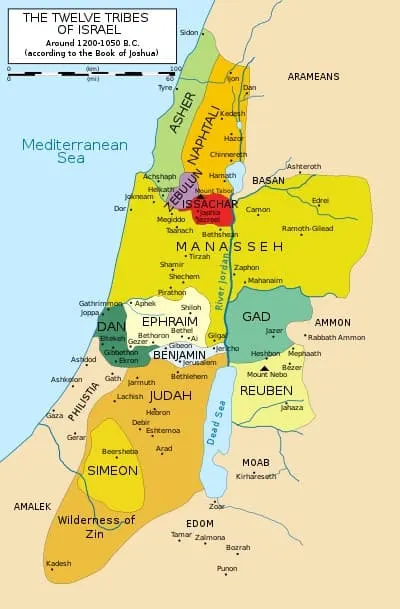This page/post may contain affiliate links. As an Amazon Associate, as well as an affiliate of other programs, this means if you purchase something using these links, I will receive a commission on qualifying purchases at no cost to you! For more detailed information, please visit our Affiliate Disclaimer page
Whew! We made it! After a year-long study on the tribes of Israel, we conclude with the Tribe of Ephraim. (You can read about the previous tribes, as well: Reuben, Simeon, Levi, Judah, Dan, Naphtali, Gad, Issachar, Joseph, and Manasseh) The tribe of Ephraim in the Bible is named after Joseph’s son. Ephraim’s name comes from the word meaning “For God has made me fruitful in the land of my affliction.”

Ephraim is the second son of Joseph and Asenath, the daughter of Potiphera, priest of On. He named him Ephraim:
“For God has made me fruitful in the land of my affliction.” – Genesis 41:52 (ESV)
Although born to Joseph and Asenath, Jacob “adopts” both Manasseh and Ephraim as his own. Joseph received the birthright from Jacob, and instead of just one tribe, he is the ancestor of two (Manasseh is the other). He is also the great-great grandson of Abraham. As discussed in the post on the Tribe of Manasseh, Moses placed Ephraim (the younger son) before Manasseh (the older son).
And Joseph took them both, Ephraim in his right hand toward Israel’s left hand, and Manasseh in his left hand toward Israel’s right hand, and brought them near him. And Israel stretched out his right hand and laid it on the head of Ephraim, who was the younger, and his left hand on the head of Manasseh, crossing his hands (for Manasseh was the firstborn). And he blessed Joseph and said,
“The God before whom my fathers Abraham and Isaac walked,
the God who has been my shepherd all my life long to this day,
the angel who has redeemed me from all evil, bless the boys;
and in them let my name be carried on, and the name of my fathers Abraham and Isaac;
and let them grow into a multitude in the midst of the earth.”
When Joseph saw that his father laid his right hand on the head of Ephraim, it displeased him, and he took his father’s hand to move it from Ephraim’s head to Manasseh’s head. And Joseph said to his father, “Not this way, my father; since this one is the firstborn, put your right hand on his head.” But his father refused and said, “I know, my son, I know. He also shall become a people, and he also shall be great. Nevertheless, his younger brother shall be greater than he, and his offspring shall become a multitude of nations.” So he blessed them that day, saying,
“By you Israel will pronounce blessings, saying,
‘God make you as Ephraim and as Manasseh.’”
Thus he put Ephraim before Manasseh. Then Israel said to Joseph, “Behold, I am about to die, but God will be with you and will bring you again to the land of your fathers. Moreover, I have given to you rather than to your brothers one mountain slope that I took from the hand of the Amorites with my sword and with my bow.”- Genesis 48:13-22 (ESV)
Ephraim had at least 3 sons: Shuthelah, Beker, and Tahan. I Chronicles 7 also mentions two additional sons: Ezer and Elead. After they are killed, he has another son, Beriah, who is the ancestor of Joshua.

After the kingdom divides, the Northern Kingdom’s capital is in Ephraim’s territory, and the prophets sometimes refer to the entire nation as “Ephraim”.
With weeping they shall come,
and with pleas for mercy I will lead them back,
I will make them walk by brooks of water,
in a straight path in which they shall not stumble,
for I am a father to Israel,
and Ephraim is my firstborn. – Jeremiah 31:9 (ESV)
I know Ephraim,
and Israel is not hidden from me;
for now, O Ephraim, you have played the whore;
Israel is defiled. – Hosea 5:3 (ESV)
The Territory of the Tribe of Ephraim
At the time of the first census in the wilderness this tribe numbered 40,500. Forty years later, when about to take possession of the Promised Land, it numbered only 32,500.
Of the people of Joseph, namely, of the people of Ephraim, their generations, by their clans, by their fathers’ houses, according to the number of names, from twenty years old and upward, every man able to go to war: those listed of the tribe of Ephraim were 40,500 – Numbers 1:32-33 (ESV)
During the march Ephraim’s place was on the west side of the tabernacle.
“On the west side shall be the standard of the camp of Ephraim by their companies, the chief of the people of Ephraim being Elishama the son of Ammihud, his company as listed being 40,500. And next to him shall be the tribe of Manasseh, the chief of the people of Manasseh being Gamaliel the son of Pedahzur, his company as listed being 32,200. Then the tribe of Benjamin, the chief of the people of Benjamin being Abidan the son of Gideoni, his company as listed being 35,400. All those listed of the camp of Ephraim, by their companies, were 108,100. They shall set out third on the march. – Numbers 2:18-24 (ESV)

The boundaries of the portion of the land assigned to Ephraim are given in Joshua 16:1-10. It included most of what was afterwards called Samaria (as distinguished from Judea and Galilee). It is located in the center of all traffic, from north to south, and from Jordan to the sea, and was about 55 miles long and 30 wide.
The people of Joseph, Manasseh and Ephraim, received their inheritance.
The territory of the people of Ephraim by their clans was as follows: the boundary of their inheritance on the east was Ataroth-addar as far as Upper Beth-horon, and the boundary goes from there to the sea. On the north is Michmethath. Then on the east the boundary turns around toward Taanath-shiloh and passes along beyond it on the east to Janoah, then it goes down from Janoah to Ataroth and to Naarah, and touches Jericho, ending at the Jordan. From Tappuah the boundary goes westward to the brook Kanah and ends at the sea. Such is the inheritance of the tribe of the people of Ephraim by their clans, together with the towns that were set apart for the people of Ephraim within the inheritance of the Manassites, all those towns with their villages. However, they did not drive out the Canaanites who lived in Gezer, so the Canaanites have lived in the midst of Ephraim to this day but have been made to do forced labor. – Joshua 16:4-10
Characteristics of the Tribe of Ephraim
During the time of the judges and the first stage of the monarchy this tribe manifested a domineering and haughty and discontented spirit. Joshua the first conqueror, Gideon the greatest of the judges, and Saul the first king, belonged to one or other of the three tribes. It was not till the close of the first period of Jewish history that God ‘refused the tabernacle of Joseph, and chose not the tribe of Ephraim, but chose the tribe of Judah, the Mount Zion which he loved’. When the ark was removed from Shiloh to Zion the power of Ephraim was humbled.”
He rejected the tent of Joseph;
he did not choose the tribe of Ephraim,
but he chose the tribe of Judah,
Mount Zion, which he loves. – Psalm 78:67-68 (ESV)
Among the issues that disrupted Israel was Ephraim’s jealousy of the growing power of Judah. From the settlement of Canaan till the time of David and Solomon, Ephraim had held the place of honor among the tribes. The Tribe of Ephraim occupied the central and some of the best portions of the land and had Shiloh (Israel’s spiritual capital at that time) and Shechem within its borders. But when Jerusalem became the capital of the kingdom, and the center of power and worship for the whole nation of Israel, Ephraim declined in influence and power. The discontent came to a head when Rehoboam’s refused to grant certain amends that were demanded (1 Kings 12). After the division, “Ephraim” is accused of forsaking God, and its attempts to establish another altar are considered an act of apostasy. Deuteronomic scholars describe the Tribe of Ephraim as being dominant, arrogant, envious, and filled with discontent.

What We Can Learn from The Tribe of Ephraim
We are all sinners The history of the early Israelites (particularly The Tribe of Ephraim), reflects our overall flawed and sinful nature.
for all have sinned and fall short of the glory of God, – Romans 3:23 (ESV)
When God Calls Us, We Must Answer While God gifted the tribe as warriors and valiant fighters, Ephraim failed to follow God’s order to remove the Canaanites from the Promised Land. No matter the cost, struggle, or difficulty, we should always follow what God asks of us.
“When my angel goes before you and brings you to the Amorites and the Hittites and the Perizzites and the Canaanites, the Hivites and the Jebusites, and I blot them out, you shall not bow down to their gods nor serve them, nor do as they do, but you shall utterly overthrow them and break their pillars in pieces. You shall serve the Lord your God, and he will bless your bread and your water, and I will take sickness away from among you. – Exodus 23:23-25 (ESV)
Display Godly Kindness, Always During the time of the judges, the Ephraimites became angry with Gideon because he had not initially called for their help in battling the Midianites (Judges 8:1). Gideon wisely displayed godly kindness and extolled the tribe’s commitment and willingness to serve the Lord, thus diffusing what could have become an ugly situation (Judges 8:2–3). Glory and Honor Belong to God, Not Humans However, ugliness did arise later, and again it can be linked to Ephraim’s pride, jealously, and self-centeredness. When Jephthah chose to fight the Ammonites without the aid of the proud Ephraim warriors, a civil war erupted, and 42,000 warriors from Ephraim were killed. As Jesus said in His Sermon on the Mount, we are to seek first the kingdom of God. Do not seek glory for yourself; all honor and glory always belong to God, not to man.
But seek first the kingdom of God and his righteousness, and all these things will be added to you. – Matthew 6:33 (ESV)
Learn to Accept God’s Will for Us Often, God chooses to use us in a manner less glamorous or spectacular than we would like. Do we pout? Do we yearn for glory? Do we control our pride and jealousy and accept God’s will? Many of us, like the Ephraimites, have difficulty learning those lessons well. God says that we should accept what happens to us as His will, regardless of how good or bad those circumstances seem to us.
Rejoice always, pray without ceasing, 18 give thanks in all circumstances; for this is the will of God in Christ Jesus for you. – 1 Thessalonians 5:16-18 (ESV)
God Loves Us as Only He Can The biggest lesson from the history of Ephraim is that God loves us as the Perfect Father despite our failings. He is patient and merciful beyond our understanding. He hears our cries of anguish, disciplines and guides us, knows our moments of repentance, and yearns for us to be in perfect communion with Him.
And you shall be my people,
and I will be your God.” – Jeremiah 30:22 (ESV)
I have heard Ephraim grieving,
‘You have disciplined me, and I was disciplined,
like an untrained calf;
bring me back that I may be restored,
for you are the Lord my God.
For after I had turned away, I relented,
and after I was instructed, I struck my thigh;
I was ashamed, and I was confounded,
because I bore the disgrace of my youth.’
Is Ephraim my dear son?
Is he my darling child?
For as often as I speak against him,
I do remember him still.
Therefore my heart yearns for him;
I will surely have mercy on him,
declares the Lord. – Jeremiah 31:18-20 (ESV)
Interesting Facts About the Tribe of Ephraim
- The Tribe of Ephraim was conquered by the Assyrians in 723 BCE.
- It is one of the ten lost tribes of Israel.
- Notable tribesmen from Ephraim include Joshua and Samuel
Where are the Descendants of Ephraim now?
Many biblical scholars agree (but it is not unanimous) that the descendants of Ephraim settled in Britain because:
- The British Empire fulfilled part of the blessings of Joseph to civilize the world.
- The name Angle from whom came the name Anglo-Saxon and Angle-land (i.e. England) in Hebrew means “bull-calf”. Ephraim was called a bull-calf.
I have heard Ephraim grieving,
‘You have disciplined me, and I was disciplined,
like an untrained calf; (Hebrew: “aegel” or “angle”)
bring me back that I may be restored,
for you are the Lord my God. – Jeremiah 31:18 (ESV)
 Britain is often referred to as John Bull. Ephraim is associated with aristocracy and the institution of aristocracy still rules in Britain. You may enjoy this short video sermon on Ephraim in the Bible:
You may also like these recommended resources for further study:
My book,
Did you know much about the tribe of Ephraim in the Bible before this post? What did you find most interesting? What else does the Tribe of Ephraim teach us about God?
Because of Him,
Sue



